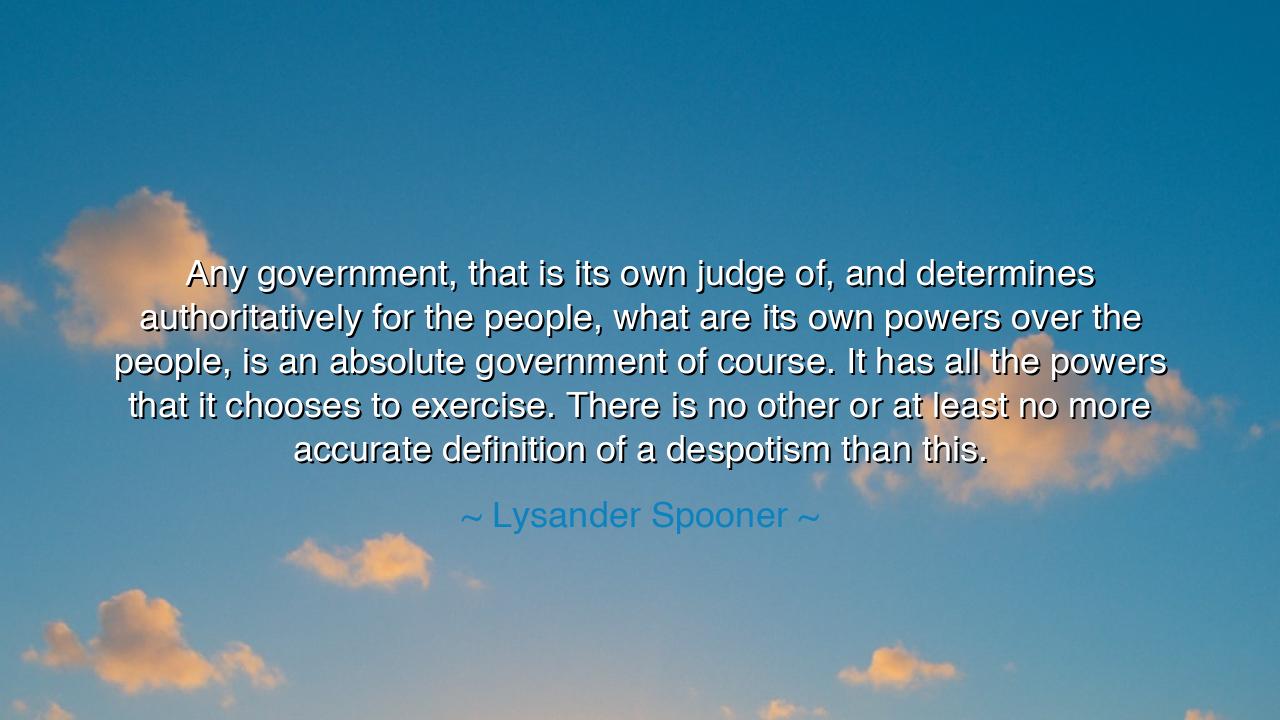
Any government, that is its own judge of, and determines
Any government, that is its own judge of, and determines authoritatively for the people, what are its own powers over the people, is an absolute government of course. It has all the powers that it chooses to exercise. There is no other or at least no more accurate definition of a despotism than this.






When Lysander Spooner wrote, “Any government, that is its own judge of, and determines authoritatively for the people, what are its own powers over the people, is an absolute government of course. It has all the powers that it chooses to exercise. There is no other or at least no more accurate definition of a despotism than this,” he was not merely crafting a legal argument — he was issuing a warning carved in the language of freedom’s deepest fear. His words arise from the heart of the 19th century, an age still trembling with the memory of monarchs and empires, and trembling again at the rise of modern bureaucracies cloaked in democracy. Spooner, a fierce abolitionist, jurist, and defender of individual liberty, saw what few dared to see: that tyranny does not always arrive with the sword; sometimes it comes wearing the robes of law.
The origin of this quote lies in Spooner’s great work “No Treason: The Constitution of No Authority” (1867–1870), written in the wake of the American Civil War. He believed the U.S. Constitution had become an idol — worshiped by those who claimed it was a contract binding all people, even those who had never consented to it. For Spooner, legitimacy must come from consent, and no government can claim just power if it alone decides the scope of its own authority. His argument cut to the very root of despotism: when rulers become the judges of their own limits, there can be no limit at all. Such a government may still hold elections, wave flags, and sing of freedom — but it will, in truth, possess all the powers it chooses to possess.
This truth has echoed through history like a solemn bell. In the days of King Louis XIV of France, when the monarch declared, “I am the state,” the world saw what it means for government to judge itself. The crown, unchecked by any law but its own, devoured the people it claimed to protect. Taxes grew unbearable, dissent was silenced, and the splendor of Versailles shone only because millions suffered in shadow. Spooner’s insight warns that despotism need not wear a crown; it may just as easily wear a constitution — if that constitution answers only to the rulers, and not to the ruled.
There is a darker, modern reflection of this truth in the rise of totalitarian regimes of the 20th century. In Stalin’s Soviet Union, in Hitler’s Germany, in Mao’s China — each government wrote laws not to bind itself, but to justify whatever it desired. There were courts, parliaments, even elections — but all served the state, not the people. When law ceases to be the boundary of power and becomes its servant, the mask of democracy becomes the face of tyranny. Spooner foresaw this principle long before it took shape: when the government becomes both lawmaker and judge, freedom becomes an illusion.
Spooner’s tone is not one of despair, but of defiant enlightenment. He calls his readers — then and now — to remember that government is not the source of rights; it is their protector. The people, not the rulers, are the sovereigns. When the governed cease to question authority, the seed of despotism takes root in silence. To accept the idea that the government can define its own boundaries is to accept that liberty exists only by permission — and that is no liberty at all.
His words resonate like a moral law older than nations: no one should be the judge in his own cause. This ancient principle, cherished by philosophers and jurists since Aristotle, is the very foundation of justice. Spooner merely extended it to the state itself. A government that judges its own reach is like a wolf deciding how many sheep it may devour. Power must always be restrained by something outside itself — by truth, by conscience, by the consent of the free. When these vanish, the language of law becomes the language of oppression.
The lesson of Lysander Spooner’s wisdom is both timeless and urgent: liberty requires vigilance, not reverence. No citizen should worship the state, nor trust it blindly to define its own virtue. To protect freedom, one must question constantly, challenge relentlessly, and resist the slow drift toward obedience. Each generation must decide whether it will live as masters of its government or subjects of it.
So let this teaching be carried forward: beware the day when your government calls itself righteous without scrutiny, or declares its own powers to be self-justified. For that day, freedom will already be dying. Hold your rulers to account. Bind them with law that answers to the people, not to themselves. And remember — as Spooner did — that true liberty is not granted by governments; it is guarded against them.






AAdministratorAdministrator
Welcome, honored guests. Please leave a comment, we will respond soon